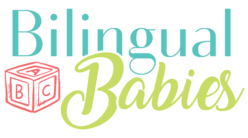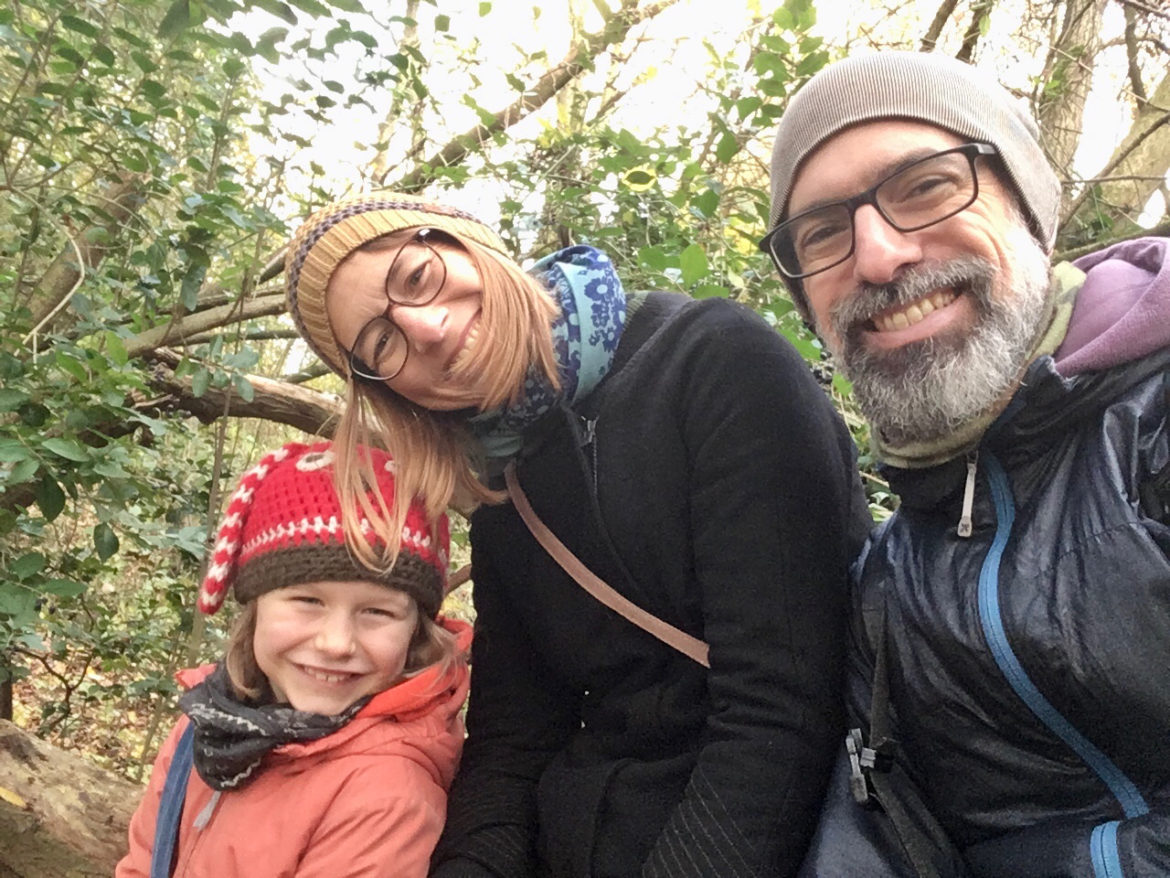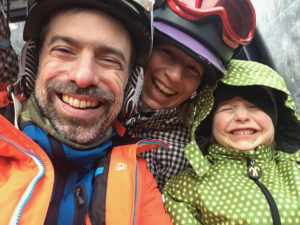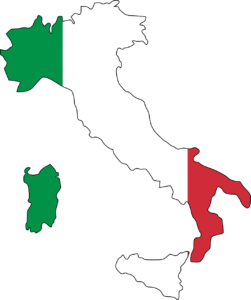Dr. Marije Michel is a Professor of Language Learning at the University of Groningen in the Netherlands and the mom of a trilingual 7 year old girl. Marije grew up bilingual herself in a Dutch speaking family in the German part of Switzerland. Now she is using her own experiences and her professional knowledge to support her daughter on her journey to not only develop her languages, but also to help her create language and cultural identities across all her languages.
Mom: Dutch, Swiss & high German, English, Italian, French
Dad: Italian, Dutch, English – and a little bit of German
Daughter (7 years): Dutch, Italian, English
Veronika:
Hi Marije, Thanks a lot for taking the time for an interview today. My first question for you is: who belongs to your family, and who speaks what to whom and when?
An Italian-Dutch-Swiss family
Marije:
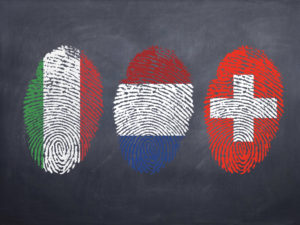 There are three of us. My partner, Davide. He’s Italian by birth. He was born and raised in Italy, our daughter, Elin is seven years old. She was born in the UK in Liverpool, but now we live in the Netherlands. I was born and raised in Switzerland by Dutch parents. So I grew up bilingual, Dutch and German. With my partner Davide, I usually speak Dutch because he learned Dutch quite well. Before we met, he already spoke Dutch at a high level. He always speaks Italian with our daughter, and I always speak Dutch with our daughter. When it’s the three of us together, most of the conversation is in Dutch, sometimes it is in Italian. When Davide and Elin start a conversation in Italian, I’ll join in Italian, but quite often, we switch back to Dutch. My Italian is not bad. It’s okay and I can keep up a conversation, but Dutch is just easier.
There are three of us. My partner, Davide. He’s Italian by birth. He was born and raised in Italy, our daughter, Elin is seven years old. She was born in the UK in Liverpool, but now we live in the Netherlands. I was born and raised in Switzerland by Dutch parents. So I grew up bilingual, Dutch and German. With my partner Davide, I usually speak Dutch because he learned Dutch quite well. Before we met, he already spoke Dutch at a high level. He always speaks Italian with our daughter, and I always speak Dutch with our daughter. When it’s the three of us together, most of the conversation is in Dutch, sometimes it is in Italian. When Davide and Elin start a conversation in Italian, I’ll join in Italian, but quite often, we switch back to Dutch. My Italian is not bad. It’s okay and I can keep up a conversation, but Dutch is just easier.
When you were raised bilingually yourself, which language do you choose to speak to your child?
Veronika:
Interesting. With Elin, have you two always followed this approach, you speak Dutch and Davide speaks Italian?
Marije:
 Yes, we have the classic one parent, one language (OPOL) approach. Elin was born in the UK, so she had English in daycare and as soon as we left the house. When she was born, I did have this question at the beginning of what am I going to do? Because as I said, I’m bilingual, Dutch/German, so I had to make a decision on that. I made the decision that it should be Dutch because I think it’s the language that is closest to my heart. I was raised myself in Dutch. My parents spoke Dutch at home and still do. So Dutch is also the language with the grandparents. That’s why I wanted it. She should be able to talk to her grandparents. I’m bilingual, in essence, German, but it’s actually Swiss German, which is a dialect. I wasn’t sure if that would be—and I have to admit it sounds horrible—but if that would be the most useful language to know. And then standard German, which I also speak to a high level, is not close enough to my heart. I never experienced it as a family language. I felt it would be a bit awkward to speak standard German to Elin.
Yes, we have the classic one parent, one language (OPOL) approach. Elin was born in the UK, so she had English in daycare and as soon as we left the house. When she was born, I did have this question at the beginning of what am I going to do? Because as I said, I’m bilingual, Dutch/German, so I had to make a decision on that. I made the decision that it should be Dutch because I think it’s the language that is closest to my heart. I was raised myself in Dutch. My parents spoke Dutch at home and still do. So Dutch is also the language with the grandparents. That’s why I wanted it. She should be able to talk to her grandparents. I’m bilingual, in essence, German, but it’s actually Swiss German, which is a dialect. I wasn’t sure if that would be—and I have to admit it sounds horrible—but if that would be the most useful language to know. And then standard German, which I also speak to a high level, is not close enough to my heart. I never experienced it as a family language. I felt it would be a bit awkward to speak standard German to Elin.
Choosing the language that is closer to the heart
Veronika:
Yes, your feelings towards a language matter a lot. A language is part of our identity, of who we are. So what did you do to keep up Dutch and Italian with Elin other than just regularly speaking to her?
Marije:
We have tons of music records. We have been listening to a lot of songs from the beginning. We have a lot of CDs, but there’s also a lot of YouTube songs in both Italian and Dutch that we listen to. Also, we read a lot of books to her. We also read bedtime stories now. When I read them, it’s in Dutch and when Davide does it, it’s in Italian. What we also do is use apps on the phone or iPad, and when she wants to play or do something, we switch it to Italian because currently, we live in the Netherlands so Dutch is very dominant anyway.
Using iPads, TV, and movies to the minority language(s)
When we still lived in the UK, there was basically one strong rule because English was dominant back then, and Elin spent a lot of time in the English context that no English media was allowed in the home back then. It would happen once in a while, but we made sure that would be either Dutch or Italian and only in exceptional cases English. And now that we moved back to the Netherlands it is all Dutch. So when she wants to watch movies or listen to stories, it’s usually Italian, sometimes English. If Italian isn’t available, we switch it to English. So, she watched all her cartoons like Pokémon etc., in Italian. But if something is not available in Italian, then we switch to English to keep up with the English a little bit which she had learned when we lived in the UK for the first three and a half years of her life.
Veronika:
Have you noticed any attrition in English since you moved to the Netherlands again?
Marije:
Well, she was three and a half when we moved, I don’t know really how her skills in English were because I never spoke English with her. I don’t think I can judge that. But I was actually positively surprised; recently, we had friends visiting from the UK and they spoke English with each other. Elin didn’t speak “pidgin English”. It was not something like “No go there.” She used sentences like “Don’t go there. No, that’s interesting; not right.” It sounded quite good! I was surprised.
Veronika:
That’s interesting.
Marije:
I think that’s based on the input she receives from movies, the solid base from three and a half years living in the UK, and now, she has regular input.
A playful way to make your child stick to the rule of speaking her minority language
Veronika:
Yes, that’s possible. Have you experienced any challenges with any of the languages?
Marije:
Yes, we’ve definitely noticed that her Italian is good, but not as strong as her Dutch. We noticed this especially last year. Because of the pandemic, we couldn’t travel. Usually, we go to Italy once in a while for holidays or the Italian family comes to visit. When I’m not around, my daughter speaks Italian to her dad all the time, but as soon as I’m around, there is a tendency to switch to Dutch. And so, due to Covid we had less Italian for quite a while because we were all home and I was always there, and Italian was just tied to her father. So, we established a rule: she needs to speak Italian to her dad.
So, for example, when she starts speaking in Dutch to her father because I’m around, I start talking in Italian to her and she hates it. Then she turns to me and says, “Mom, you’re not allowed to speak Italian to me,” and I said, “Okay, then you talk Italian to your father. She knows that rule and she adheres to it.
Veronika:
There you go…yes, it’s really good to have these consistencies in place.
There’s a lot of father-daughter time, and that’s exclusively spent in Italian
Marije:
 Yeah. I think why it also works for us with each of us keeping up one language is that we have a 50/50 labor split. Davide and I share the household tasks, share our time with her and we both work. So Elin spends a lot of time with her father when I’m away, so they do have those moments where it’s clearly Italian, when I’m not involved, you know, and that helps. They sing songs together. There was this Italian summer hit this year, Mille by Fedez, Lauro and Orietta Berti, and they both know the lyrics. There’s a lot of father-daughter time, and that’s exclusively Italian.
Yeah. I think why it also works for us with each of us keeping up one language is that we have a 50/50 labor split. Davide and I share the household tasks, share our time with her and we both work. So Elin spends a lot of time with her father when I’m away, so they do have those moments where it’s clearly Italian, when I’m not involved, you know, and that helps. They sing songs together. There was this Italian summer hit this year, Mille by Fedez, Lauro and Orietta Berti, and they both know the lyrics. There’s a lot of father-daughter time, and that’s exclusively Italian.
Veronika:
Yes, I think that’s a very important point. I’ve heard a lot of bilingual families say “No, you know, it’s the dad who speaks the minority language, so it’s not going to work anyways.” I think what you said is actually the key as to why it works: it’s how much time you spend with a child. So it’s a matter of being able and willing to invest time regardless of whether it’s the mother or the father.
Why it’s important to get your child together with peers who speak the minority language
Marije:
Yes, definitely. And what we’ve also tried to do from the beginning on is to meet up with our families that speak Italian. We have some Italian families around here whose children also speak Italian and where she can play with Italian children. So it’s not just the language of the grownups, it’s also her type that uses it.
Veronika:
That’s an important factor. We have that too, but sometimes the children do switch to English because it’s so predominant here in the United States, and some of the other parents are just not consistent enough with German.
What if your partner doesn’t speak your language
Marije:
I think one of the reasons why it actually works is that, as I said, we both speak each other’s languages. I don’t feel excluded when they speak Italian. I can totally engage and understand. I’m not left out when they speak Italian, and my partner doesn’t feel left out when we speak in Dutch. We understand each other’s languages, and I think that’s also quite important.
Veronika:
Yes. At least having an idea of what is being talked about is important. We do have the situation in my family that my husband does not speak my language, German. He is not a person who enjoys learning languages and there has been no real need for him to learn German because I speak English, my entire family  in Germany speaks English, my friends around the world speak English, and we live in the U.S.. So he has not made a serious effort so far to learn German, but he has picked up a considerable number of basic words and phrases that we use throughout the day like “Ella, Zähne putzen!” or “Sag Gute Nacht!”.
in Germany speaks English, my friends around the world speak English, and we live in the U.S.. So he has not made a serious effort so far to learn German, but he has picked up a considerable number of basic words and phrases that we use throughout the day like “Ella, Zähne putzen!” or “Sag Gute Nacht!”.
He and I talked about him not speaking German early on when Ella was still very little. I wanted to know how he feels when I speak German and if he feels left out at times. He said that if he felt left out he should not be the one complaining because he hasn’t put forth the effort to learn German. But even though he is not a driving force when it comes to learning languages, he is very supportive. He said he trusted that we did not talk about him behind his back and he was 100% in support to raise our children with both languages and cultures. So we have established the system that when we are all together, I repeat in English what I said the German to keep him in the loop. But I always stick to “German first” so cognitively, the children have to process the minority language first. And…yes, sometimes I do forget to translate and he pipes up, but overall he is able to make out what is being talked about.
Marije:
Interesting. I learned Italian with Elin. So when she was starting to speak, I also picked up a lot of vocabulary, but by now she’s way ahead of me.
Veronika:
Yes, same here. When I was pregnant, I remember my husband saying at some point, “Oh, I’m just going to learn German with Ella.” and I said “Well, then you have a year and a half to become fluent…”
Marije:
Haha…he’ll never catch up. Children blow everyone out of the water in terms of acquiring their first language or languages.
Veronika:
That’s true! I think there are ways of making it work, whether your partner does or does not speak the minority language, as long as you add some crucial “ingredients” to the everyday life like input and exposure to the minority language, interaction with the children in all languages, and providing a supportive environment that allows them to establish their own identity vis-a-vis the different languages.
Spending time in Italy to allow your child to experience Italian culture
Speaking of exposure and opportunities to experience the language and culture, we have 13 weeks of parental leave for both my partner and me that we can take for children up to the age of eight. It’s part of our labor agreements and we will use the time this year. We’re going to take leave from October until Christmas, and we’re going to spend our time in Italy. We’re going to go there and Elin will be able to attend an Italian school, have Italian life experiences so that it’s not just holidays, but it’s the actual day-to-day life.
Veronika:
That’s interesting. We have been thinking about doing something similar. My husband is a professor and we were thinking of him taking a sabbatical and spending it in Hawai’i. My husband’s cultural background is Hawaiian. His mother is a native Hawaiian, and he got his PhD at the University of Hawaii so he could do research there.
Marije:
Yeah, it’s a great opportunity for all family members and one that can also be beneficial for learning the language and culture. I at least plan on improving my Italian again, so that’ll be nice.
Veronika:
Where in Italy are you going?
Marije:
We’re going to go to Udine, close to the Slovenian border, roughly in between Venice and Trieste. It’s in the northeastern region called Friuli.
Veronika:
Oh nice! I’ve been to Trieste as an Erasmus lecturer a long time ago. It’s a very nice area. Enjoy that time!
Okay, there are two more questions that I have for you. The first one is: since you are an academic, is there anything that came out of research in the past years that you found particularly interesting or helpful for raising bilingual children?
Research says that in a minority context, it doesn’t harm if the non-native parent joins in the minority language once in a while
Marije:
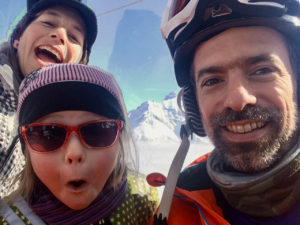 Well, there used to be a time when people were quite strict about the idea of the one parent, one language (OPOL) approach. It was assumed that if you wanted to succeed, OPOL is the only approach you should take. I don’t recall the references but I do know that there’s more recent research that shows that in a minority context, it doesn’t harm if the non-native parent joins in the minority language. In the beginning, I was much stricter on me always using Dutch, I always said I can’t join in the Italian conversation because my Italian is not native. But following what I had been reading that OPOL is not the only or best way, and that it actually strengthens the minority language if you can occasionally join conversations in the minority language, made it much easier. That made me adapt easier to using Italian with Elin.
Well, there used to be a time when people were quite strict about the idea of the one parent, one language (OPOL) approach. It was assumed that if you wanted to succeed, OPOL is the only approach you should take. I don’t recall the references but I do know that there’s more recent research that shows that in a minority context, it doesn’t harm if the non-native parent joins in the minority language. In the beginning, I was much stricter on me always using Dutch, I always said I can’t join in the Italian conversation because my Italian is not native. But following what I had been reading that OPOL is not the only or best way, and that it actually strengthens the minority language if you can occasionally join conversations in the minority language, made it much easier. That made me adapt easier to using Italian with Elin.
OPOL is one, but not necessarily the “best” way to raise a child bilingually
Veronika:
Yes, that is an important finding that is much in line with Annick de Houwer’s study in which she found that only about 75% of the children who are raised under OPOL conditions actually become bilingual in the sense of them speaking the minority language. I think she had a fairly large number of about 2,000 families included in the study.
Marije:
Oh, really? Well, I would totally agree with that. I wasn’t raised with OPOL because both my parents were Dutch. I was brought up in a bilingual context, and based on those experiences, I remember that, as a child when our holidays weren’t the same as they were in the Netherlands, we would go to the Netherlands and I could join friends in school. I have never spent lengthy times in Dutch schools, but throughout my childhood, I’ve been to Dutch schools once in a while for a week or two. I always accompanied friends. I remember that being an important part of my identity building in the sense hat I could just go to a Dutch school, join in, and no one would notice. Well, maybe they did notice, but at least I did not feel awkward not being Dutch.
Veronika:
 I think you are bringing up a very important point: identity formation. Giving a child the ability to develop an identity in all of their languages and creating a positive relationship to the minority language and culture is important. For instance, as a parent if you just talk to your children in your language, but the children do not live in the minority language and cultural context, it is technically your identity, your language, your culture as a parent. So it’s not necessarily your children’s culture. They are technically one step removed. So they will have a very different experience forming and developing their relationship with the minority language and culture. And supporting your child in that identity formation process is a critical factor, I think. Sabine Little in the UK has done some interesting work on identity formation in bilingually raised children. In fact, she has published a paper together with her son, Toby, on his personal journey of developing an identity in German. It’s a very unique and interesting paper and Toby was only a child when they published their observations in a journal article.
I think you are bringing up a very important point: identity formation. Giving a child the ability to develop an identity in all of their languages and creating a positive relationship to the minority language and culture is important. For instance, as a parent if you just talk to your children in your language, but the children do not live in the minority language and cultural context, it is technically your identity, your language, your culture as a parent. So it’s not necessarily your children’s culture. They are technically one step removed. So they will have a very different experience forming and developing their relationship with the minority language and culture. And supporting your child in that identity formation process is a critical factor, I think. Sabine Little in the UK has done some interesting work on identity formation in bilingually raised children. In fact, she has published a paper together with her son, Toby, on his personal journey of developing an identity in German. It’s a very unique and interesting paper and Toby was only a child when they published their observations in a journal article.
Bilinguals tend to have multiple identities across their languages
Marije:
Interesting. I know there’s a clash in public opinion. The research shows that bilinguals do have multiple identities, whereas, in the public discourse, it sometimes is suggested that people can only have one identity. As a result, you have to choose citizenship because you cannot have both. You cannot have the Dutch and the German citizenship; you have to choose. But it doesn’t change your identity, you have both identities as a bilingual.
Veronika:
That’s right.
Siblings who are bilingual can have very different language and cultural identities
Marije:
My brother, for example, has chosen to stay in Switzerland. He still lives in Switzerland but he does speak Dutch with his children. They are second generation Dutch speakers. His Dutch isn’t perfect, but it’s there. It’s good enough so they can talk to my parents, their grandparents. But when he was asked once about his identity, he also gave the answer of ‘I am much more Swiss, but I would like to be more Dutch.’ And for me, it’s definitely the other way around. I’m very, very Dutch, even though I lived in Switzerland for the first 20 years of my life. I feel much more Dutch than anything else and I think it’s okay.
Veronika:
Bilingualism and identity is a very interesting and current topic. As your brother’s example shows, you both grew up in the same home, but you developed very unique and distinct identities.
The last question that I have for is this: what piece of advice would you give to parents who are either already raising children with multiple languages or are thinking about doing so?
Advise from a bilingual mom: Don’t stress out, and be consistent.
Marije:
Definitely do it! Don’t stress out, and really try to be consistent. There will come a time when your child refuses to speak your language, but don’t give up. Make sure you create opportunities where it’s natural to use the minority language. It can either be a playdate or finding other families that speak that language so that they can also see peers speaking it. I do think that children at some point don’t want to be the odd one out, and if you model to them, or create opportunities that show they are not the odd one out, there are actually other children that are also able to speak different languages, that are also able to switch between languages, I think that’s important. So, when you notice that your child is hesitant or stops speaking your language, try to find ways to make it more normal or natural. And if you have the opportunity, try to find a nanny or a babysitter that speaks your language as well. We had that also. We had a student here, an Italian student that came over once in a while as a babysitter. She didn’t speak Dutch, the only language she could speak was Italian. I think that’s also important. Create those opportunities in which children have no choice but use their minority language.
Veronika:
Yes, that’s a good point. Create the need for them to use the That needs to be created.
Have fun with codeswitching moments
Marije:
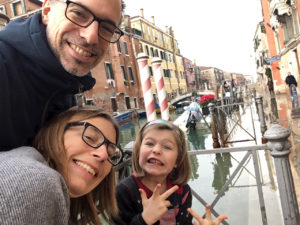 Yes, and enjoy the fun that comes with it. So, one of Elin’s favorite things was when she was three or four years old, she came home with a phrase or something that she said ‘a boerderia’ like a farm in Italian it’s ‘fattoria’, and in Dutch it’s ‘boerderij’. And last week, she came home with ‘mi schricavo dood’ which means ‘I’ve been zu Tode erschrocken’. So she used the Dutch ‘me dood schrikken’ – with the difficult sound cluster ‘schr’ and the Italian verb formation for past tense, which is also cool. I was so proud when I heard it because you could really hear that she has this fully-fledged phonological and morphosyntactic system. All the sounds and structures of the different languages.
Yes, and enjoy the fun that comes with it. So, one of Elin’s favorite things was when she was three or four years old, she came home with a phrase or something that she said ‘a boerderia’ like a farm in Italian it’s ‘fattoria’, and in Dutch it’s ‘boerderij’. And last week, she came home with ‘mi schricavo dood’ which means ‘I’ve been zu Tode erschrocken’. So she used the Dutch ‘me dood schrikken’ – with the difficult sound cluster ‘schr’ and the Italian verb formation for past tense, which is also cool. I was so proud when I heard it because you could really hear that she has this fully-fledged phonological and morphosyntactic system. All the sounds and structures of the different languages.
Veronika:
Yeah, that’s true. Those code-switching moments are a lot of fun. We had one last week: “Mama, ich hab das getookt. Und Mama, I have a Schnöttnase!” is one of my favorites.
Marije:
Definitely. We have that in Swiss German too. We say ‘Schnuddernase’ and also in Dutch ‘snotneus’.
Veronika:
Haha! That is a truly international concept. Well, many thanks for taking the time and sharing your bilingual journey, Marije!
Marije:
THANK YOU for giving me the opportunity to talk about our multilingual experiences.
